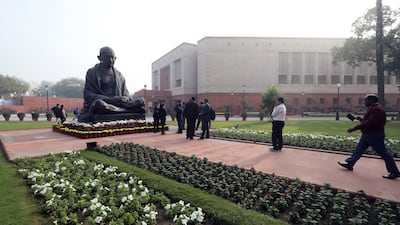India on Monday introduced three criminal laws to replace the justice system imposed by its former British rulers more than a century ago but critics say the new legislation grants the state unbridled powers over citizens.
The Bharatiya Nyaya Sanhita (BNS), Bharatiya Nagarik Suraksha Sanhita (BNSS) and Bharatiya Sakshya Adhiniyam (BSA) were rushed through parliament in December by Prime Minister Narendra Modi's government.
As many as 141 opposition MPs were suspended at the time.
The government said the new laws would overhaul the criminal justice system, particularly in dealing with cases of sexual assault, crimes against children, lynching and crimes against the state.
“By removing the old laws with a slave mentality, the Modi government is implementing three new laws reflecting the spirit of Indian-ness. At the core of these laws is a strong sense of justice instead of punishment,” Law and Justice Minister Arjun Ram Meghwal said on Sunday.

The BNS replaces the Indian Penal Code, the criminal code introduced by the British in 1862, while the BNSS replaces the Code of Criminal Procedure, covering procedures for arrest, investigation, and trial, which was been amended several times since it was introduced in 1882.
The BSA replaces the Indian Evidence Act, introduced in 1872, which outlines evidence admissible in courts.
The laws will allow digital or electronic records as evidence, as well as the appearance of witnesses, defendants, experts and victims through electronic means.
The law also requires compulsory audio and video recording of arrests and search and seizure operations in all criminal cases that will be produced in court as part of the evidence.
It will allow citizens to register a police complaint at any station, irrespective of jurisdiction and faster justice delivery as it has mandated judgments within 45 days of the completion of trial and charges framed within 60 days of the first hearing.
The laws will make it compulsory for forensic experts to visit crime scenes for serious offences and mandatorily record videography evidence to prevent tampering.
But legal experts, opposition leaders, civil society members and non-governmental organisations have criticised the laws, saying they were passed in haste without a discussion with stakeholders and are a threat to personal liberty.
The Bar Council of India has asked the government to review the legislation and several lawyers' associations have threatened to go on strike and hold protests against its implementation.
“Concerns have been raised that several provisions of these new laws are perceived to be anti-people, more draconian than the colonial-era laws they intend to replace and pose a serious threat to the fundamental rights of citizens,” the Bar Council said in a statement last week.
The strongest criticism of the laws is that they give police sweeping new powers to arrest, investigate and prosecute without much oversight or accountability.
India’s law enforcement agencies largely lack independence and are often seen as an extension of the ruling political class. Several government commissions and Supreme Court rulings have recommended major reforms to insulate them from political influence.
The police often face allegations of corruption, torture, unlawful arrests and harassment and are widely viewed with fear and suspicion by the general public.
The new laws allow police to seek custody of suspects for up to 90 days without formal charges, up from 15 days previously, which critics say is inimical to the rights of detainees in a country where nearly 4,500 custodial deaths were reported between 2020 and 2022, according to official figures.
Police can also make arrests under the Unlawful Activities Prevention Act – under which it is difficult to arrange bail – without prior sanction from the executive, as was the case previously.
Critics have also highlighted that the new laws give police arbitrary powers in cases where the prescribed jail term is less than seven years. Police can decline to file impromptu complaints about crimes – known as First Information Reports — and have a 14-day period to determine the validity of allegations.
Several Supreme Court judgments had made it mandatory for police to file FIRs upon receiving a complaint from the victim, to prevent corruption.
The law also overturned previous Supreme Court rulings, which had barred police from using handcuffs on suspects.
"They have given rope to the police and expect them to be particularly solicitous of citizens' rights. It is an unfounded hope," Sanjay Hegde, a Supreme Court lawyer, told The National.
The All-Indian Lawyers Association for Justice, a non-government body, has said the new laws solidify the state’s powers introduced by the colonial powers.
It said the sections that deal with terrorism were of particular concern, including granting arbitrary powers to police officers to charge suspects.
Several new provisions have been introduced to deal with armed rebellions, subversive activities, separatist activities, and terrorism. Critics say the addition of “endangering sovereignty or unity and integrity” of the country as a crime could be misused.
Cases filed before the new laws took effect on Monday will continue to be dealt with under the provisions of the old criminal code, which will create more work for judges and lawyers, Mr Hegde said.
"Each of these [new sections] have to be interpreted afresh," he said. "The laws will take a long time to settle. We have a century or more worth of interpretation. We would sometimes be reinventing the wheel, sometimes go round the mulberry bush. This will keep lawyers and judges engaged at public expense."
The main opposition party, the Indian National Congress had demanded that "more debate should be held and people should be taken into confidence” before the laws took effect.


